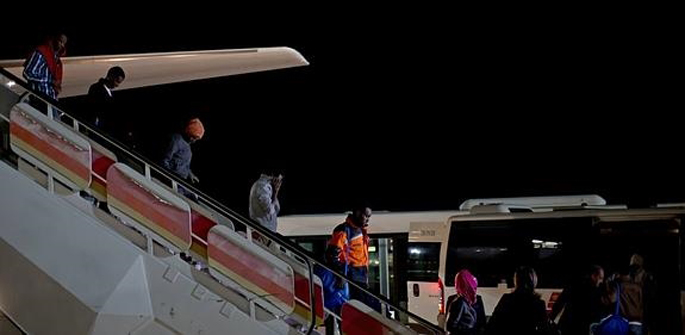
With the help of the European Union, at the moment only ten people have arrived in the Basque Country (three Eritreans in Bilbao, and three Afghans, Eritreans, Tajikistanos, a stateless and three Sudanese in Baigorri). But along the usual lines last year, for example, some 125 asylum applications were processed in Hego Euskal Herria (mainly sub-Saharan). Patricia Barcelona has explained to us that the usual procedure is the same in all the countries of the European Union, based on the Geneva Convention. There are, however, countries that do not comply with the directives and countries such as Greece have been warned on more than one occasion by the EU, for not also guaranteeing minorities.
In our case, the Spanish and French States have all their powers in this matter, and similar action is taken in both cases. What changes is the model, such as the granting of shelters in apartments or centres. Citizens arriving and seeking asylum can apply for two protections: recognition of refugee status and subsidiary protection. Within one month, it is decided whether or not to accept the procedure for the application, and if this first stage is exceeded, the procedure will be initiated until the final decision is reached. During this time, the refugee should be guaranteed information, documentation, housing and basic social, legal and health needs on his or her rights and obligations. “In theory, the law says the procedure for making a decision will last 6 months, but we also have cases that have lasted 5 years. The origin of the applicant is related to: When the Government expects that the conflict in the country of origin can be resolved in the medium term, it hopes that it will be resolved so that it can be resolved definitively. The resolution will be to deny asylum on the grounds that the conflict has been resolved. This so-called ‘prudence criterion’ has been applied on numerous occasions by the Government of Spain, with Ukraine and many countries in Africa, in the case of Mali, in the case of Côte d’Ivoire… and that’s why there are so many dossiers that last so long.”
Until it is decided, the person who has come to our house does not experience a delicate situation: he cannot work until six months have elapsed since the application procedure began. “In practice,” added Barcelon-, even after these six months they have great difficulties, as companies and individuals often do not understand their documentation, they see it as provisional. In addition, pending the final resolution, this uncertainty is experienced with a great deal of anxiety – for fear of being denied – and some people withdraw from their petition and eventually leave because they do not receive an answer.” Once the dossier has been resolved, there are three options: granting refugee status, declaring humanitarian reasons or refusing them. If he refused, he would become a paperless migrant. With all that entails.
The case of the 160,000 refugees that the EU has to allocate to relocate to European countries is different. The procedure is faster: they have not come directly to the Basque Country to seek asylum, they have come to Europe and the first step is already taken – the choice of the petition is accepted. From there, “we hope that the emergency procedure will be applied to them and that it will be definitively decided within a maximum of three months,” said the director of the Refugee Assistance Commission.
The Commission itself, the Red Cross and the associations working with refugees are responsible for managing the system of protection – the search for shelters, etc. – of asylum seekers, but, as has already been mentioned, the competition is the responsibility of state governments. “What the governments of the CAV, of Navarra and the municipalities of each place can do is to improve the system, because it has gaps, from the moment they arrive until they enter the protection system, to leave it, or even when they are within that protection system, because sometimes there are not enough resources to meet the needs they have.”
According to Patricia Barcelona, “the attacks in Paris have revived the xenophobia of some, but there is also a great wave of solidarity, and that is what we have to value and value. If the relocation of refugees is carried out in an organised manner, with the involvement of regional and local institutions, I believe that the positive view towards foreigners and refugees can prevail. They have wanted to fill the head with negative elements towards immigration, they have filled us with prejudices, and it may be time to turn it around and to value the plurality that is already, in favor of coexistence”.
Failure of integration policies: http://www.argia.eus/argia-astekaria/2487/errefuxiatu-krisi-globala
And what about arrival in Europe? : http://www.argia.eus/argia-astekaria/2487/errefuxiatu-krisi-globala-3
"Segurtasun gehiago, inmigrazio gutxiago". Bruno Retailleau barne ministro frantsesa argi mintzatu da, kargua hartu berritan. Etorkinen gaineko kontrola azkartu nahi du Michel Barnier lehen ministro eskuindar-kontserbadorearen gobernuak, eta jada Retailleauk aitzinatu... [+]
Europar Batasunean berriki onartu den Migrazio Itunak, asko zaildu dizkie gauzak euren herrialdetik ihesi doazen eta asiloa eskatzen duten pertsonei. Eskuin muturraren tesiak ogi tartean irentsita, migratzaileentzako kontrol neurri zorrotzagoak onartu dituzte Estrasburgon,... [+]
Migratzaileen kopurua anitz emendatu da Irun eta Hendaia arteko pasabidean. Irungo Harrera Sareak ohartarazi duenez, otsailean 600 pertsona lagundu dituzte, iaz, urte osoan 2.700 izan zirelarik. Iragan urtarrilean, 2.700 etorkin heldu dira Kanariar Uharteetara, egunero 80... [+]